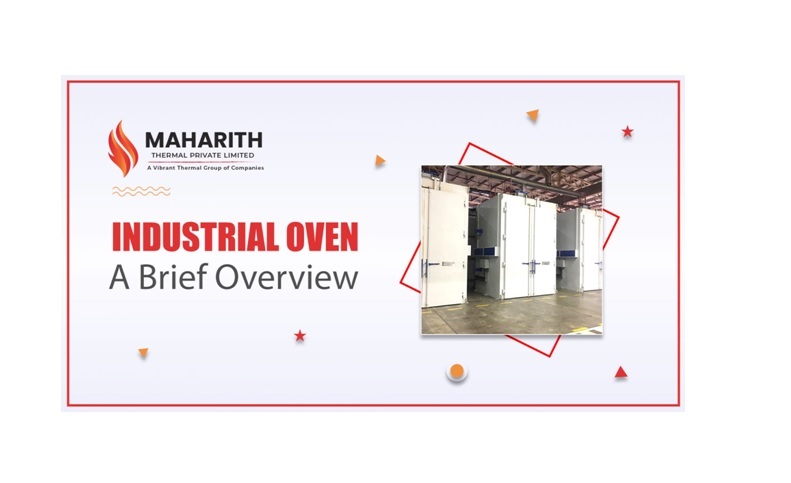Industrial ovens are used in a variety of sectors, including chemical processing, oil and gas, pharmaceuticals, medical, materials, and automotive.
So, what exactly are industrial ovens? They are thermal units that function as heating chambers and come in a variety of forms and sizes, including bench-top, batch-type, and conveyor-type ovens. Industrial ovens may handle a variety of tasks. Among other things, they activate adhesives, meld materials, shrink, preheat, melt, laminate, and thermal bind materials. However, picking the proper Industrial Oven for your application is a vital step in the purchasing process.
For What Purpose Are Industrial Ovens Used?
An industrial-grade oven’s primary function is to lower moisture levels in a huge quantity of material. These ovens are used by most industries for drying paint, making baked goods, and applying some types of coating that demand high temperatures. There are hundreds of models to pick from, each with unique features and modifications that are appropriate for their use.
Top Industrial Oven Types Include:
There are just too many different types of industrial ovens to mention them all. Furthermore, new ovens are always being released by one of the leading Industrial Oven Manufacturers in India. As a result, we’ve listed the most prevalent varieties and their applications below:
Electric Oven
These ovens heat up rapidly, accurately manage temperature, and save processing expenses. They are well-suited for baking, annealing, powder coating, and welding. and used to cure flammable goods, paint curing for water, solvent, and powder-based paints, and finishing such as epoxy and varnishes. These ovens do not have any moving components and are simple to clean and maintain.
Laboratory Oven
These ovens are suitable for instances when you need a tiny oven that can do simple tasks. They are perfect for everything from drying glassware to controlling and recording sophisticated heating applications. When evaluating materials in a lab oven, stability and reproducibility are crucial to guarantee that the oven is not skewing the findings. Laboratory ovens are known for their high performance, exceptional homogeneity, and reliable results.
Direct Gas Oven
Convection is used to spread heat in gas ovens. They are useful for component casting, curing coatings on steel parts, preheating casting molds, and eliminating water from cast ceramic parts. Also, they are available in direct and indirect designs. Direct gas ovens are more costly than electric ovens but have reduced operating expenses.
Baking Oven
These ovens liberate moisture, volatile chemicals, or trapped gas from the coatings of completed items. Curing components are best cured in thermal processing equipment that combines curing and drying, such as baking ovens. They accelerate the drying process by eliminating moisture from the air, resulting in a flawless finish. Furthermore, they heat powder coatings to their melting temperatures, allowing them to cling to metal. These ovens are also often used in the food supply and packaging sectors to heat food goods.
Curing Oven
These types of ovens are available in a variety of styles. Curing ovens are well-suited for applications such as the bonding of paint or powder to metals and the hardening of rubber, plastic, and metal goods. They have steel-insulated panels and frames and are powered by electricity, hot oil, UV rays, steam, or natural gas.
Drying Oven
These ovens are ideal for eliminating moisture from items, heat-treating metals for the extrusion process, and sterilizing medical equipment. Natural or forced convection heat is used in these vacuum ovens for granular materials, powders, and electronic components. If you use them to remove moisture, use the product moisture level to establish the oven settings.
Batch Oven
These industrial ovens come in a variety of forms and sizes and are designed to heat big volumes of stuff. Your decision is determined by your application. Batch ovens are heated directly or indirectly by electrical components or burners. These ovens extract gas trapped in items that cause degradation.
Conveyor Oven
These ovens are designed for mass production and include variable speeds, a cooling zone, numerous heating zones, and exhaust hoods. Drying, curing, annealing, stress relief, bonding, tempering, preheating, and shaping are some of the applications. Because of their conveyor belt architecture, they may be simply added to production or assembly lines.
Common Questions to Ask Yourself Before Buying an Industrial Oven!
Purchasing an industrial oven might be tough and time-consuming. Understanding your demands is critical to selecting the proper industrial oven for your application.
What are your industrial demands and applications?
Knowing what you want your oven to perform helps you decide what features and capabilities you want. Will you be annealing, curing, or drying in your oven? Or will you bake, sterilize, or heat treat with it? Is it going to be in a laboratory, a clean room, or an industrial space? This information is crucial for locating the best industrial oven.
What chamber size do you need?
The size of the product or part, the number of products in each batch, and your daily processing demands are all factors that influence chamber size. You should also think about the space between pieces or items. A tiny space limits performance. A big area wastes energy. You must also consider the oven’s capacity, airflow requirements without waste, and chamber type (stainless steel, mild steel, or aluminum).
What are your Temperature Requirements?
Maximum/minimum temperatures, needed dwell time at temperature, overall cycle time, and heat-up and cool-down rates are all factors to consider here. You should also consider the type/amount of product load, the amount of heating capacity required to bring the product to the appropriate temperature in the stipulated time, and the total heating capacity of the oven. Is the oven’s heating capability adequate to bring the product to the necessary temperature within the stated cycle time? Is it necessary to regulate the temperature rate?
The Final Verdict
Before choosing an industrial oven, consider the following seven crucial questions. Answering them demonstrates a thorough awareness of your requirements. It also streamlines and simplifies the choosing process. Finally, you’ll have an industrial oven that is not only dependable, cost-effective, and simple to maintain and run, but also appropriate for your application.
If you’re looking for Industrial Oven, then you can buy it from Maharith Thermal Pvt. Ltd. We export premium-quality industrial furnace, industrial ovens, water quench furnaces, etc. at affordable prices. With our team’s support and knowledge, we have gained the position of one of the top Industrial Oven Exporters in India. Our team members concentrate their whole knowledge on creating and providing the best solutions to fulfill the needs of our clients.


